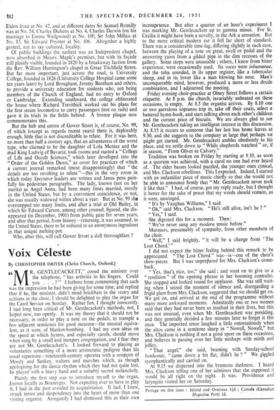Voix Celeste
64 R. GENTLECACKETT," cooed the minister over the telephone, "has arthritis in his fingers. Could you . . . ? " I forbore from commenting that such was the impression he had been giving for some time, and replied that if he, the minister, didn't mind brickbats in the vestry and schisms in the choir, I should be delighted to play the organ for the Carol Service on Sunday. Rather fun, I thought innocently. I had long been critical of Mr. Gentlecackett's methods, not, I hoped now, too openly. It was my theory that it should not be necessary, in order to play a note on the-pedals, to trample a few adjacent semitones for good measure—the musical equiva- lent, as it were, of blanket-bombing. I had my own ideas on the speed at which hymns, and especially carols, should move when sung by a small and inexpert congregation, and I fear they are not Mr. Gentlecackett's. I looked forward to playing as voluntaries something of a more aristocratic pedigree than his usual repertoire—nineteenth-century operetta with a soupcon of Moody and Sankey, waltzes and marches which, as though apologising for the dance rhythm which they had not quite lost, be played with a heavy hand and a suitably sacred melancholy.
Plainly the first step was to introduce myself to the -Organ, known locally as Boanerges. Not expecting ever to have to play it, I had in the past avoided its acquaintance. It had, I knew, struck terror and despondency into the heart of more than one visiting organist. Arrogantly I had dismissed this as their own incompetence. But after a quarter of an hour's experiment I was marking Mr. Gentlecackett up to gamma minus. For St. Cecilia it might havebeen a novelty, in the Ark a sensation. But to the more critical modern ear it fell far short of standard. There was a considerable time-lag, differing slightly in each case, between the playing of a note on great, -swell or pedal and the answering yawn from a gilded pipe in the dim recesses of the gallery. Some stops were unuseable ; others, I knew from bitter experience, were occasionally used. Its voces were inhumanae, and the tuba sounded, in its upper register, like a tubercular sheep, and in its lower like a man blowing his nose. Man's unconquerable mind, however, produced a more or less docile combination, and I adjourned the meeting.
Friday evening choir-practice at Olney Street follows a certain etiquette. At 8 p.m. the church, invariably unheated on these occasions, is empty. At 8.5 the organist arrives. By 8.10 one or two garrulous sopranos trip in, take off their coats, select a battered hymn-book, and start talking about each other's children and the current price of biscuits. We are always glad to see Mr. Gentlecackett taking an intelligent interest in this discussion. At 8.15 it occurs to someone that her last bus home leaves at 9.30, and she suggests to the company at large that perhaps we iight get started. Mr. Gentlecackett ambles obediently to his place, and we settle down to "While shepherds watched or, if in season, "From Olivet to Calvary."
Tradition was broken on Friday by starting at 8.10, as soon as a quorum was achieved, with a carol no one had ever heard of. The elder basses looked puzzled, the younger ones cynical, and Mrs. Clackson rebellious. This I expected. Indeed, I started with an unfamiliar piece of music chiefly so that she would not be able to announce firmly that "Mr. Gentlecackett never took it like that." I had, of course, got my reply ready, but I thought it better for the sake of peace that my words should remain, as it were, unwinged.
"It's by Vaughan Williams," I said.
"Oh," said Mrs. Clackson. "He's still alive, isn't he ? " "Yes." I said.
She digested this for a moment. Then: "We've never sung any Modern music before."
Murmurs, presumably of sympathy, from other members of the choir.
"Well," I said brightly, "it will be a change from 'The Lost Chord.'" I did not expect the bitter feeling behind this remark to be appreciated. "The Lost Chord" was—is—one of the choir's show-pieces. But I was unprepared for Mrs. Clackson's come- back.
" V'es, that's, nice, too," She said ; and went on to give us a " rendition " of the opening phrase in her booming contralto. She stopped and looked round for applause. She was still wait- ing when I seized the moment of silence and, disregarding a frigid glare from Mrs. Clackson, suggested that we should get on. We got on, and arrived at the end of the programme without many more awkward moments. Admittedly one or two women said that they had never been so insulted in their lives, but this was not unusual, even when Mr. Gentlecackett was presiding, and they generally decided a few minutes later to forget it this • once. The imported tenor laughed a little ostentatiously when the altos came in a semitone sharp in "Nowell, Nowell," but Mrs. Clackson is nothing if not a good sport on these occasions, and believes in passing over her little mishaps with mirth and jollity. "That angel," she said, beaming with Sunday-school bonhomie, "came down a bit flat, didn't he ? " We giggled sycophantically and carried on. At 9.15 we dispersed into the brumous darkness. I beard Mrs. Clackson telling one of her admirers that she supposed it would be all right on the night. It was. Providence and laryngitis visited her on Saturday.






























 Previous page
Previous page